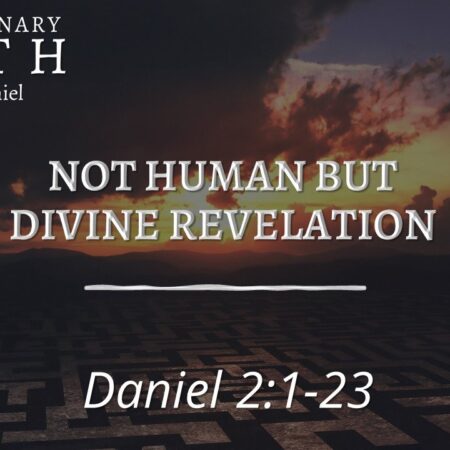Daniel 2:1-23
Genesis 41
2 Kings 6:8-23
Daniel 2:10-11
Daniel 2:12-16
Daniel 2:19-23
2 Peter 1:16-21
Examples of Human Revelation:
• The Fourth Turning (William Strauss and Neil Howe)
• 1984 (George Orwell) a Novel published in 1949
I’ve quoted this author numerous times during the last two years.
You may remember some of the quotes:
“Who controls the past controls the future.”
“War is peace. Freedom is slavery, Ignorance is strength.”
• Brave New World (Aldous Huxley wrote this novel in the shadow of the rise of fascism during the 1930s.) “Brave New World is a searching vision of an unequal, technologically-advanced future where humans are genetically bred, socially indoctrinated, and pharmaceutically anesthetized to passively uphold an authoritarian ruling order – all at the cost of our freedom, full humanity, and perhaps also our souls.”
Francis Schaeffer nailed it when he wrote the book titled:
“He is There and He is not Silent”
John Lennox in his book “Against the Flow” makes this observation:
“Daniel knew that Nebuchadnezzar was not prepared to reveal the content of the dream. But Daniel believed that there was a God who knew not only the content of the dream but its meaning. He also believed that, if he so desired, God could reveal that information to him. So now the story advances the concept of revelation one level deeper.
It is not Human Revelation now, BUT DIVINE.”
“When Daniel related the content of the dream to Nebuchadnezzar in all of its detail, Nebuchadnezzar had all the evidence he needed to believe in revelation. That belief was warranted, since there was no way, apart from divine revelation, that Daniel could have known what thoughts had gone through the king’s mind while he dreamed. Nebuchadnezzar now had strong reason to take seriously the claim that God had given Daniel the interpretation. But that did not mean that Nebuchadnezzar would be uncritical – he would also use his reason to see if the proffered interpretation made sense. And so can we, since the whole account lies before us.”

